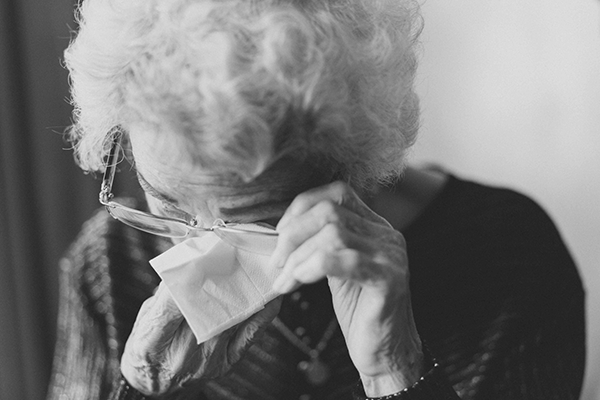Grief and Loss
By Darren Devlin
Rural Aid counsellor and community representative
When we think about grief and loss, we normally think about those that have passed away and the grief that we feel following a death. However, loss can relate to the breakdown of any connection that we have, whether it be with another person or a pet, a cherished item, or a way of life. We can also grieve the loss of a belief or way of seeing the world. One thing that I have learned in my years supporting people through the grief and loss process is that it is a very individualistic process. One that everyone feels and works through in their own way. There is no right or wrong way, there is no set time frame, and there isn’t even a guarantee that you will put the loss behind you and move on.
There is, however, the knowledge that grief is a normal human response to loss and that everyone at some point in their life will experience grief and therefore, it is not a sign of weakness or ability to cope. It is a sign that you are human and that your body and mind are responding to a specific set of circumstances within your experience in a normal and appropriate way.
How do we experience grief?
Grief can be felt in the body and in the mind, causing feelings of sadness, anger, anxiety, shock, regret, isolation, overwhelm, irritability or numbness, and yes, sometimes, it can even bring on feelings of relief. Having worked in the end-of-life space as a social worker, it was not unusual for me to be told by family members that they feel bad because they feel relieved by the passing of a loved one. In instances where a person has been a carer for a long period of time and watched their loved one suffer through a devastating illness, the carer may often find themselves relieved that the pain of watching their loved one suffer has ended.
It is also relatively common for people who have suffered a loss to experience their own physical symptoms, such as colds and flus, body aches and pains, sleeplessness or disturbed sleep, loss of motivation and difficulty finding enthusiasm for the things they previously enjoyed.
Grief can also affect us mentally, especially when the loss is sudden or traumatic. Mentally, we may feel like we can’t cope, that we are stuck in a very dark place or feel like we are emotionally paralysed. It can leave us feeling confused or with greater emphasis on negative thinking and feelings of hopelessness. It can lead to avoidant and addictive behaviours as a way of escaping the negative or dark thoughts.
Coping with grief.
There is no easy answer as to how we cope with grief; it is a passage of time, one that we must work through in our own way and in our own time. It’s generally believed that the bigger the loss or the more traumatic it is, the longer it will take to grieve. However, this isn’t necessarily always the way it unfolds. While there is no easy answer to coping with grief, there are some tips that can help or at least help reduce the impact.
- Allow yourself to grieve – don’t judge your experience, remember that grief is natural and so is crying. Crying is an emotional release which allows the body to shift and process emotions. If you don’t cry, this doesn’t mean that there is something wrong with you; it may be that you are not ready to cry. Allow yourself the respect that you deserve to feel this process and give yourself the same compassion that you would show a loved one going through something similar.
- Journalling – writing down your experience can help you get the thoughts out of your head and observe them and unpack them further. Writing has been shown to be a powerful way to process thoughts, feelings and ideas that you may be stuck on.
- Live one day at a time – don’t try to do too much too fast, don’t over commit yourself and try to set yourself an achievable daily routine to try to bring some sense of normality back into your world.
- Schedule some ‘you’ time – make sure that you include in your daily routine some time every day to do something that brings you joy. You may struggle with this, as in the grieving process you may not be inclined to find much joy. Look for the small things that you can do, such as going for a walk, spending time with friends and loved ones, exercise, yoga, meditation or whatever is your jam. It doesn’t have to be big; it just has to be for you.
- Stay connected – reach out to a loved one, a friend or a social contact. Accept others’ offers for support and help and take every opportunity to spend time in the company of others.
- Build positive memories – honour the thing or person you have lost. If you’re a writer, consider journalling about your loss and the connection that you had, remember the good times, tell stories, and reinforce the good memories. If it’s a loved one you are grieving, consider writing a letter to tell them how you feel and what they meant to you. You don’t have to deliver the letter; it has been proven that simply writing the letter is a good way of healing and processing the loss of a loved one.
If you have trouble with any of the above, or you find yourself stuck in that dark space, consider reaching out for professional help. Talking to a counsellor can help you work through the grieving process and set achievable goals to aim for to help you heal. I would recommend reaching out for professional help if your grief makes it hard to tend to your day-to-day needs, if you find it hard to reconnect with your social and support network, if you have sleep disturbances, loss of appetite or have started over-eating or if you have intense emotions that you find difficult to manage.
It is most important that if you are having thoughts of harming yourself that you reach out urgently. These thoughts left untreated can lead to suicidal thoughts and self-harm.
If you are thinking of harming yourself, please call 000 immediately.
If you would like to talk to one of our skilled counsellors, please reach out to the Rural Aid Mental Health and Wellbeing intake line. Our service is free, confidential and does not require a doctor’s referral. Just pick up the phone between 9am – 5pm and call – 1300 175 594
Grief and Loss online resources
Rural Aid Counselling – Counsellors – Rural Aid – Supporting Rural Communities
Beyond Blue Grief and Loss – Grief and loss – Beyond Blue
Health Direct Grief and Loss – Grief and loss – the effects of grief and how to deal with it | healthdirect
Australian Psychological Society – Grief | APS (psychology.org.au)

